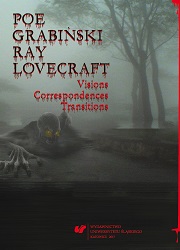“Non si lascia leggere”: il male e gli abissi del tempo in Poe e Lovecraft
“Non si lascia leggere”: il male e gli abissi del tempo in Poe e Lovecraft
Author(s): F. Francesco Marroni
Subject(s): Language and Literature Studies, Literary Texts, Studies of Literature, Philology, Theory of Literature
Published by: Wydawnictwo Uniwersytetu Śląskiego
Keywords: Edgar Allan Poe; H.P. Lovecraft; evil; metropolis; abysmal temporality; barbarism
Summary/Abstract: The image of the metropolis as a netherworld of evil is most suggestively evoked in Edgar Allan Poe’s tale ‘The Man of the Crowd’, in which the protagonist‑narrator’spursuit of a suspicious and decrepit stranger is transformed into a journey represented as a descent into a timeless urban space ruled by depravity and nefariousness. Grafting his own discourse on this story as well as on The Narrative of Arthur Gordon Pym, H.P. Lovecraftexplicitly reveals his imitation and emulation of Poe’s works. Particularly, in the short novel At the Mountains of Madness, Lovecraft confronts the power of blackness and the illegibility of evil with his story of an exploration that leads to the discovery of an underground city of the Antarctic, a blasphemous and monstrous city lying at the beginning of time – a mythical and archaic world of horror and barbarism which is a total negation of everything human.
Book: Poe, Grabiński, Ray, Lovecraft. Visions, Correspondences, Transitions
- Page Range: 13-29
- Page Count: 17
- Publication Year: 2017
- Language: Italian
- Content File-PDF

